#Everyone genders my character correctly but okay How do they know or even assume considering there doesn't seem to be
Text
Actually so evil of bg3 to have the emperor be referred to with it/its pronouns only to do the big reveal and make it a him again
#Not genuinely evil i am being dramatic etc. But sad to me#I do just hate the whole emperor reveal so much tho. He was a more interesting character before that#I still wasn't super compelled by it but thats ok. However. Ugh#In general the way bg3 does pronouns is not ideal imo like this is still a lot better than most games do it#But the fact that there is a they them option and no npc uses it#Only characters with non he/she pronouns are the two mindflayers (afaik?)#Its something for sure. Makes me think#Genuinely does make me wonder how Gender is in faerun.. Tell me more..#Everyone genders my character correctly but okay How do they know or even assume considering there doesn't seem to be#a precedent of gender neutral pronouns for other characters nor otherwise gender non-conforming characters#Yes i am thinking too much about it i know why it is the way it is. However. It is interesting to me#I like to think about this shit. Talk to me about gender in this fantasy world pspsps video game#Txt#No shade to omeluum my favorite it its mindflayer ever. U know what i mean
11 notes
·
View notes
Text
EQUAL RITES (1987) [DISC. #3; WITCHES #1]
“‘Where does it say it?’ said Granny triumphantly. ‘Where does it say women can’t be wizards?’
The following thoughts sped through Cutangle’s mind:
…It doesn’t say it anywhere, it says it everywhere.
…But young Simon seemed to say that everywhere is so much like nowhere that you can’t really tell the difference.
…Do I want to be remembered as the first Archchancellor to allow women into the University? Still…I’d be remembered, that’s for sure.”
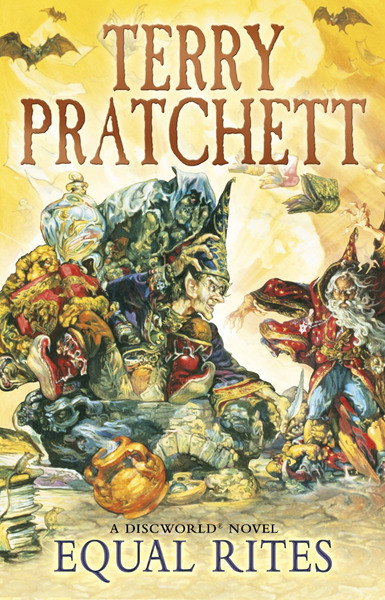
Rating: 6/10
Standalone Okay: Yes
Read First: Yeah, if you like magic and bad puns, you’ll be fine.
Discworld Books Masterpost: [x]
* * * * * * * * * *
Equal Rites does not mess around. It’s early Discworld, so you’ve still got a little bit of that High Fantasy vibe to it, where sometimes Pratchett just spews fantastical-sounding terms and concepts so that the reader can’t forget that This is Fantasy, We Are Not in Kansas Anymore, Folks! And to be perfectly honest, a lot of the plot, especially the early stuff, is kind of forgettable. There’s a lot of people talking to people about doing stuff before the actual doing gets done, if you know what I mean.
But that doesn’t really matter, because Equal Rites has important shit to say and, by god, Pratchett is going to say it. And in case you didn’t bother to read the book itself, you can tell just by looking at the title that a) it’s about gender inequality in the magical community, and b) there’s going to be puns. So many puns. Sir Terry, please, take pity on me. I just don’t have the time to go around explaining to every person I meet on the street why this kind of thing makes me absolutely batshit feral for the Discworld.
I love it so much.
Anyway. Equal Rites is the story of Eskarina Smith, or Esk, the first ever female to be born a wizard. The whole concept of ‘the eighth son of an eighth son is chosen by the magical staff of a dying wizard to become a new wizard’ brings up a lot of questions for me—a lot of questions that will never be answered—but if I ignore that and just accept that it’s true, then by Discworld tradition Esk is undeniably a wizard. She is the eighth, uh, child of an eighth son, chosen at birth by the magical staff of a wizard who promptly dies and decides to be reincarnated as a weirdly randy tree and then, later, as an ant.
…Cool, I guess.
More importantly, and also by Discworld tradition, Esk undeniably cannot be a wizard, because she’s born female. Honestly, Pratchett might as well have named this Sit Down and Shut Up While I Talk About Gender Roles and Gender Inequality, You All Are Going to Listen to Me Because I’m Going to Make Bad Puns While I Do It.
Over the course of the book, Pratchett does some deep dives into what it means to be a witch, what it means to be a wizard, how they’re the same, how they’re different—and why none of that actually matters. For something published over thirty years ago, I think Equal Rites holds up incredibly well as a conversation on gender and society, and it’s still just as relevant as ever. It just goes to show that a) writing with thought, kindness, and care makes for a timeless product, and b) society really hasn’t made that much progress since 1987, has it? It’s a little sad that the issues Pratchett wants us to think about here are still just as recognizable and just as common in the world as they were thirty-three years ago.
(Kind of as a side note, there are definitely things I don’t think Pratchett considered about the basic premise he’s set up, namely that just because Esk was born with a certain set of genitals, it doesn’t necessarily mean anything about her gender. I’ve seen a lot of discussion, especially on the internet, about trans Esk, and trans wizards and witches, and what that would mean for the Discworld universe—really interesting stuff, things people should definitely look into, but not what I’m going to focus on here. I would highly recommend that people think about it, especially cis people like me. It would be wrong to go through Equal Rites without even bringing it up, even if I read the text as more as a discussion of gender roles rather than gender identity. Since Pratchett was a cishet man writing this in the 80s, I’m also willing to bet it’s what he was intending. But it’s still an important conversation to have.)
Anyway, let’s jump in and look at the dichotomy that Pratchett is setting up for us!
What is a witch? What is a wizard? How are they the same, and how are they different? Why does that split matter?
I did the messy work of going through my copy of the book and highlighting every instance where definitions are provided for ‘witches’ and ‘wizards,’ specifically so that I could run a compare-contrast, and I want to point out right off the bat that basically all of the details on so-called ‘defining’ features of these two schools of magic are provided through characters and their POV—direct dialogue and thoughts—not by word-of-god narration or omniscient POV. So, obviously, we have to run all this through the internal bias filter; this stuff is all what people believe about wizards, witches, and magic, not necessarily how things are.
What makes a witch, according to Equal Rites:
Magic out of the ground
Dress in black to look the part
Witches bow. They’ve got to be different from everyone else; it’s “part of the secret” (headology)
Cunning, old (or they try to look it)
Suspicious, homely, and organic magic
Appearance of magic can do more work than actual magic (headology)
“Leaving the world as it was and changing the people”
They can “Borrow” and work gently
“Fighting her [Granny] was like swatting a fly on your own nose”: if you don’t struggle and make waves, you can do a lot with less outright power
Do the messy, practical stuff, not just the flash
Always, “without exception, women”
What makes a wizard:
Magic out of the sky
Over-the-top ways of dressing up to look the part, often with robes and sequins
“Books and stars and jommetry.” (Granny absolutely does not know what geometry is, or what it is for.)
“Talked too much and pinned spells down in books like butterflies,” and looked at “numbers and angles and edges and what the stars are doing”
Wise, old
Powerful, complex, and mysterious magics
Magic is condensed out of the air and into the staff, and used by the wizard
“Magic changed the world in some way, wizards thought there was no other use for it”
Can’t “Borrow,” only take/seize control
Too busy with the “infinite” and “never noticing the definite”
Always, “without exception, men”
Witches “normally work with what actually exists in the world,” while a wizard can give thoughts shape, “put flesh on his imagination.” Witches learn to walk softly and move over and around an obstacle, while wizards puff up and fight to go straight through it.
Witches “need a head.” Wizards “need…a heart.”
In short, witches are self-taught, intuitive, grounded in reality, and fluid in their magic use—when they actually use it at all. They work with what they feel and what they know about the world. Wizards are academics and learn from set rules and their books, and their magic is often over-complex, overpowered, and difficult to control. Wizards are more rigid and structured in their magic use—ritualistic, even—but less connected to reality or grounded in the real world.
And, of course, both groups wear fabulous outfits and dramatic pointed hats!
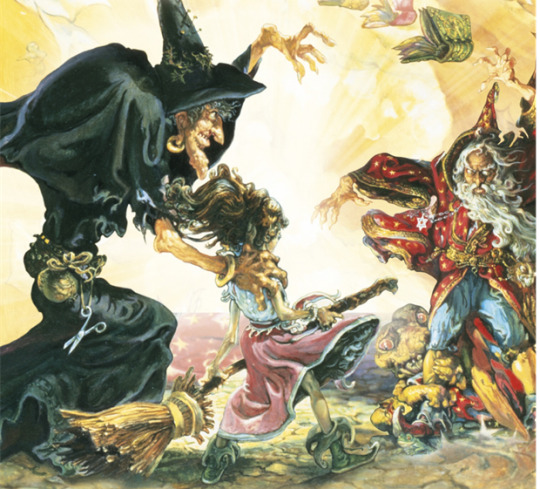
Just look at ‘em. Such wonderful weirdos.
The more I look at the ‘definitions’ like this, all laid out and proper, the more I start to think that the witches who do things we would consider ‘bad’ witchcraft are just correctly using elements of wizardry. For example, think about Mrs. Earwig, with her books and rituals, her special tools and fancy dress code; even though she doesn’t focus on the world around her or the people in it, the way a ‘good’ witch would, she’s good at what she does, and so certain in herself that she can stare down the glamor of the Queen of the Elves without flinching in The Shepherd’s Crown. On the other hand, we have our classic ‘bad’ wizard, Rincewind, who demonstrates some exceptionally witchy tendencies—he’s excellent at headology even if actual magic isn’t really in his wheelhouse, as Interesting Times makes pretty obvious. And despite the fact that he’s a coward-sprinter who’d really rather avoid danger if at all possible, when it comes down to it, he’s still the man who’ll put himself between the world and a great evil with nothing but trembling knees, a spine reluctantly turned from water to iron, and a half-brick in a sock. As Granny would say, he walks the line.
So, really, what does gender actually have to do with it? Why is there a distinction at all? Is it actually important?
And to make a long novel short, what Pratchett is saying in Equal Rites is that it’s not. There’s no difference between witchcraft and wizardry that actually makes for a good reason for a gendered split. Men aren’t inherently better at math and academia, or as Granny says, “jommetry;” women aren’t inherently more practical, emotional, or intuitive. That’s a social construct, not a biological one.
And beyond that, even, there’s no real reason for the two ‘types’ of magic to be split up at all. They might be different ways of operating, but it’s all magic. Anyone could do either. Or neither. Or both.
There’s an early conversation between Death and the wizard whose mix-up with his staff marked Esk as a wizard—just after the man has died, when he’s realized that he’s passed his magic along to a female and, in his mind, made a terrible mistake. “I was foolish,” he says, “I assumed the magic would know what it was doing.” But instead of agreeing, Death tells him, “PERHAPS IT DOES.”
It all comes down to what Esk calls magic beyond magic—the reality of the thing beyond the concepts we’ve created to define and confine it. If we’ve invented these distinctions between ‘types’ of magic, between ‘types’ of gender and the self, then what remains once we’ve removed them? What happens when we peel them away and see what’s left behind? Why do we cling to our invented categories, the things that limit both sides and create conflict?
I really like that Equal Rites never puts Esk into a specific category. She doesn’t end the book as a ‘true’ wizard or a ‘true’ witch, but she also doesn’t fully reject either. As sad as I am that Pratchett never goes much deeper into Esk (her brief appearance in I Shall Wear Midnight doesn’t actually explain much), I’m fine with not having a concrete answer. One, the other, both, neither—it’s not the point. Magic is magic. People are people. Gender is, honestly, irrelevant. Beyond the academic divides we’ve made for ourselves, it’s all the same stuff given different names. Esk does magic, and she is herself, and in the end, she’s not bound by the limitations that witches and wizards put on their reality.
Infinite possibilities!
It’s something the other wizards and witches never get to have. They’re so locked into what they believe magic to be, what they believe themselves to be, that they never really look outside those boxes.
It’s wild to me that the concept Pratchett is introducing here—specifically about wizards and witches and gender—basically disappears as long as Esk does. Esk is a really cool character; the idea of female wizards and male witches is fascinating. I want more of all this. So, I’m genuinely sad that Esk doesn’t reappear again until the Tiffany Aching books, specifically I Shall Wear Midnight—in 2010, more than twenty years after Equal Rites was published. And we don’t get another wizard or witch or magic-user in general working outside their typical gender alignment until Geoffrey appears in 2015 in The Shepherd’s Crown and asks to become a witch, and even then, the witches take to calling him a ‘calm-weaver’ instead.
I like that the idea eventually comes full circle. I don’t like that the circle takes thirty years, and goes basically unacknowledged in the meantime.
But the point Pratchett is making is still there in the Discworld, and it never really goes away. Remember how I said earlier that this stuff—all this ‘witches do and are x, wizards do and are y, that’s how it has to be’ nonsense—it’s all what people believe about magic and such, not how things are? Pratchett and Discworld are huge on belief. Belief shapes reality, belief becomes real, and we see that over and over again. But part of what Pratchett is saying here is that even if we all believe in something, then it doesn’t mean that it’s right. Just because something is doesn’t mean it should be.
More importantly, though, it also doesn’t mean we’ve locked ourselves in place. Esk proves that much. We learn. We grow. We change our understanding of our reality and ourselves, and we believe something different. And then the world changes, too.
* * * * * * * * * *
Side Notes:
We get to see Granny Weatherwax for the first time! She’s absolutely fabulous and I love this sharp-tongued bitter old lady so much. In later books starring the witches we will focus in a lot more on Granny herself as a witch and a person, rather than just as a teacher.
Granny Weatherwax is said to live in the village of Bad Ass in Equal Rites. In future books, she will live in Lancre.
There actually aren’t that many footnotes in this one. Since I kind of just…expect footnotes to appear in every book Terry Pratchett touches, despite the fact that they’re super rare everywhere else, it’s almost weirder to not see a footnote every page and a half.
Esk does some magical nonsense—mainly by not realizing the magic she’s doing should be impossible—that ends up “changing the Discworld in thousands of tiny ways.” This is probably part of Pratchett’s attempt to slowly shift what he started establishing in The Colour of Magic to what we’ll see in later Discworld books, moving from High Fantasy to more of a, I don’t know, steampunk-y magical surrealism? What even is the Discworld, I ask you? It’s impossible to describe. But what Esk does to it here is described as follows: “the wavefront of probability struck the edge of Reality and rebounded like the slosh off the side of the pond which, meeting the laggard ripples coming the other way, caused small but important whirlpools in the very fabric of existence. You can have whirlpools in the fabric of existence, because it is a very strange fabric.”
We get our first mention of sourcerers here in Equal Rites, but they’re not very well defined. We’re just told that they’re now extinct. They’ll turn up in a lot more detail in a couple books, of course, once we get to Sourcery.
Favorite Quotes:
“I know what I mean, she told herself. Magic’s easy, you just find the place where everything is balanced and push. Anyone could do it. There’s nothing magical about it. All the funny words and waving the hands is just…it’s only for… She stopped, surprised at herself. She knew what she meant. The idea was right up there in the front of her mind. But she didn’t know how to say it in words, even to herself.”
“‘But,’ he said, ‘if it’s wizard magic she’s got, learning witchery won’t be any good, will it? You said they’re different.’ ‘They’re both magic. If you can’t learn to ride an elephant, you can at least ride a horse.’”
“The old witch yanked the staff out of its shadow and waved it vaguely at Esk. ‘Here. It’s yours. Take it. I just hope this is the right thing to do.’ In fact the presentation of a staff to an apprentice wizard is usually a very impressive ceremony, especially if the staff has been inherited from an elder mage; by ancient lore there is a long and frightening ordeal involving masks and hoods and swords and fearful oaths about people’s tongues being cut out and their entrails torn by wild birds and their ashes scattered to the eight winds and so on. After some hours of this sort of thing the apprentice can be admitted to the brotherhood of the Wise and Enlightened. There is also a long speech. By sheer coincidence Granny got the essence of it in a nutshell.”
“‘Never mind what I said, or common sense or anything. Sometimes you just have to go the way things take you, and I reckon you’re going to wizard school one way or the other.’ Esk considered this. ‘You mean it’s my destiny?’ she said at last. Granny shrugged. ‘Something like that. Probably. Who knows?’”
“Animal minds are simple, and therefore sharp. Animals never spend time dividing experience into little bits and speculating about all the bits they’ve missed. The whole panoply of the universe has been neatly expressed to them as things to (a) mate with, (b) eat, (c) run away from, and (d) rocks.”
“‘Why are you holding that broomstick?’ he said. Esk looked at it as though she had never seen it before. ‘Everything’s got to be somewhere,’ she said.”
“Why was it that, when she heard Granny ramble on about witchcraft she longed for the cutting magic of wizardry, but whenever she heard Treatle speak in his high-pitched voice she would fight to the death for witchcraft? She’d be both, or none at all. And the more they intended to stop her, the more she wanted it. She’d be a witch and a wizard too. And she would show them.”
“‘Million-to-one chances,’ she said, ‘crop up nine times out of ten.’”
“For a moment he nursed the strangely consoling feeling that his life was totally beyond his control and whatever happened no one could blame him.”
31 notes
·
View notes
Text
Why Nonbinary Borderlands Fans are Mad About Zer0′s Pronouns, In a Timeline
2012
Zer0 was introduced in Borderlands 2 as a character meant to be absurdly mysterious in almost every way. Zer0 is apparently not their real name, they seem not to be human (but it’s unclear if they’re an alien, robot, or something else entirely), no one knows where they came from, etc. Still, in Borderlands 2, they defaulted to he/him, and was assumed male.
It’s worth noting that Borderlands 2 also featured Bloodwing, Mordecai’s pet alien bird. In the original Borderlands Bloodwing was referred to as he/him, but switched between games to she/her. This is explained outside the game by Burch, who says that Bloodwing’s species changes gender halfway through life.
2013
Gearbox released the Diamond Plate Loot Chest. In it was the “Pandoran Gazette” an in-universe newspaper. It included an “Ask Doctor Tannis” advice column, the last question being:
Dear Doctor Tannis,
I have heard you are acquainted with the vault hunter known as "Zer0". I have been meaning to ask - that's not really his true name, is it? Hell, maybe Zer0 isn't even a "he". Do you have any details on this mysterious figure?
- Curious in Old Haven
Dear Curious,
I am indeed acquainted with the towering stack of leather and poorly-written poetry that so many refer to as "Zer0". As you have correctly noted, "Zer0" is not the Vault Hunter's true name. Zer0's actual name and gender are (CONTINUED ON PAGE 9)
Page 9 was not included. To my knowledge, this was where it was first seeded that Zer0 may not be male.
November 2, 2014
In a panel titled “Playing as a female character panel - Does it Matter” during PAX Australia, Gearbox CEO Randy Pitchford discussed Zer0’s gender:
“The other things that’s interesting to me is sometimes when there’s characters that don’t have a gender or have an ambiguous gender I’ll choose them...In Borderlands 2 we left Zer0’s identity very ambiguous. What gender is he?” *crowd laughs* “We need better pronouns, don’t we? Don’t we need better pronouns?” (Timestamp)
“What’s the gender of Zer0?….That says more about me than it does say about Zer0, the fact that I use the pronoun he when I describe Zer0. In fact, um, we purposely have left Zer0’s gender ambiguous. There’s a lot of folks at Gearbox that like to think that maybe Zer0’s of a particular species that doesn’t have gender- That is more androgynous.” (Timestamp)
(Timeline continues under cut)
November 25th, 2014
The first episode of Tales From the Borderlands was released. Anthony Burch answered this question on his Ask.fm:
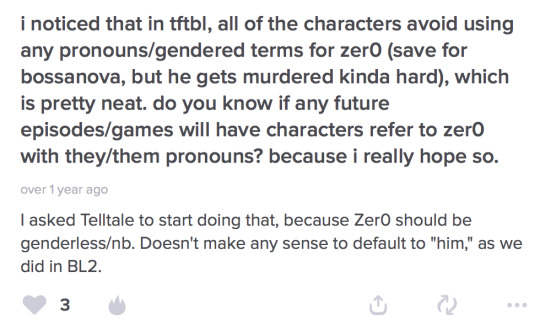
To my memory, tumblr blew up with excited nonbinary fans. Prior to seeing screenshots of this, I really didn’t have interest in Borderlands. The idea of a cool nonbinary character who used they/them pronouns, admist a virtual desert of representation, made me play through the entire series as fast as I could so I could catch up in time to see these pronouns in action. For a long time afterwards I’ve seen other nonbinary people expressing the same sudden interest in the series after learning this about Zer0. Because, yeah, it was a pretty big deal.
2015:
Zer0 appeared again in episode 5 of Tales, released almost a year later after the first. Their voice had changed to one that sounds more ambiguous in terms of gender, but Zer0 was still being referred to as “he/him”.
Anthony Burch was one of the writers on this episode. Afterward, he answered this on his ask.fm:
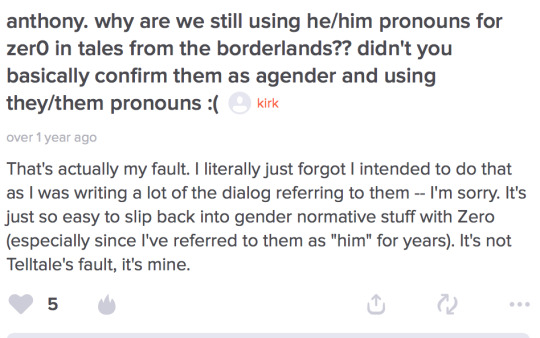
Since he claimed it was honestly a mistake, nonbinary fans held out hope. There were posts going around tumblr clarifying that yes, Zer0 was still nonbinary, and still was meant to use they/them pronouns. It was just a mistake made by a thoughtless cisgender man.
Of course, then some presumably-cisgender fan goes to Burch, and validates him, because clearly a character can’t just up and CHANGE pronouns! It’s not like anyone ever does that in real life!
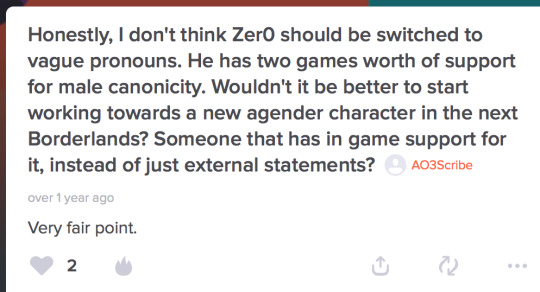
It’s not a fair point. It’s a dumb point from someone who has no stakes in this.
(Another thing worth noting is it has only been other characters who referred to Zer0 as he/him. Zer0 has never made a point of standing up for their own pronouns.)
After this Burch just kind of gives up on the whole idea.
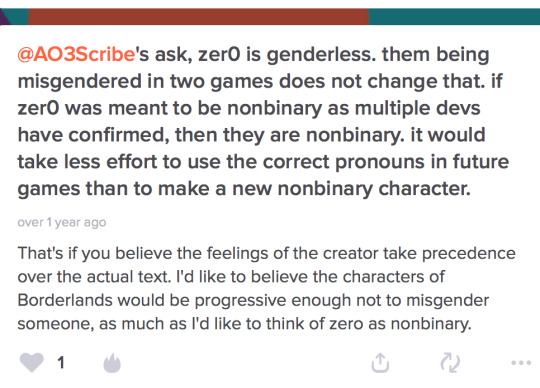
This statement about characters being “progressive enough not to misgender someone” is weird, because the characters, even the sympathetic ones, in Borderlands have often blatantly failed to be progressive. The original Borderlands has the worst of it, it’s your basic 2009 edgelord shit. There’s blatant misogyny, not to mention the extremely homophobic joke surrounding Mr. Shank (and within that the transphobic joke about his girlfriend being a man in a wig).
Burch only started writing for the game in Borderlands 2, however. It’s a huge step up, but there’s still a lot of bigotry. Captain Scarlett makes a “no fatties” joke. Mr Torgue fat-shames Ellie. Mr Torgue uses the R-slur. Multiple characters slut-shame Moxxi. Incest jokes surrounding Scooter, who also is implied to be a huge creep towards women.
Heck, there’s the entirety of Sir Hammerlock’s Big Game Hunt DLC is a racist, colonialist mess. Its antagonist is implied to be gay, one of two gay male characters introduced thus far, and he’s a pathetic, creepy stalker.
This is the game series where there are two common enemy types whose names are straight up ableist.
So citing characters as being “too progressive” rings hollow with this context.
Besides, trans people are often misgendered, even by people who’d otherwise be considered progressive.
Burch left Gearbox the same year, so he’s not entirely to blame for what anything afterwards. He just set a pretty bad precedent.
2019:
Gearbox did seem to take the “make a new nonbinary character” thing to heart.
They give us Fl4k, again a nonhuman character, who uses they/them pronouns. And okay, I love Fl4k, but like most nonbinary people I’m tired of all nonbinary characters being robots, aliens, or otherwise non-human in appearance (a trope that yes, Zer0 falls into as well). Still, Fl4k is cute and having a nonbinary playable character who uses they/them pronouns is cool! I definitely plan to play as them.
Many nonbinary fans were suspicious though, it seemed likely that Fl4k might be meant to appease us and they could keep on using he/him for Zer0.
We were proven right when they released the gameplay preview on May 1st. We hear Zer0 called “he”. None of us are surprised, but it still hurts, we felt like we’d been baited with Zer0.
Besides, why can only one character at a time be nonbinary? Why can a bird change pronouns but not a person? Why was a writer allowed to go out and promise this if it wasn’t going to be followed through on (yes, he didn’t use the word “promise” but telling a marginalized group something like that isn’t something you can just “forget” without people feeling betrayed)?
And that’s where we’re at, as of me writing this.
I feel like there are some comments I’m bound to get on this, so I’ll answer them here:
Why are you making such a big deal about this?
Me typing a few paragraphs isn’t making a big deal. But I feel misled and baited. After a few years of no clarification after Burch promising us they/them Zer0, a lot of people hung on to hope. A lot of people became big fans of Zer0 because they’re a fun, badass, nonbinary character. Their design is really, really rad! And heck, they were (at least for a time) the most popular playable character in Borderlands 2. Telling everyone, in-game, “actually Zer0 was never really a he, they’ve been a ‘they’ this whole time” would have been HUGE. Like how Blizzard made Overwatch’s poster girl, Tracer, canonically a lesbian, and then revealed their badass gruff guy (who fills the roll of your basic FPS protagonist), Soldier 76, to be a gay man.
They/them are still not widely accepted pronouns.
For us who use them, it’s difficult to convince people not to default to something gendered. Especially when we fail to appear completely androgynous. I’ve been told Zer0 can’t possibly be nonbinary because they have a deep voice and “masculine” body shape. But real nonbinary people come in all shapes and sizes with all kinds of voices!
What about Fl4k?
As I said, I’m very happy about Fl4k. They fall into some problematic tropes even more than Zer0 (as Fl4k is verified beyond a doubt to be a robot, and has an “acceptable” androgynous shape to them). I don’t know their voice yet, I wouldn’t be surprised if it also fell into the category of “acceptably androgynous”.
Fl4k is new and already “they/them”. Zer0 is an established character who already has a lot of fans among a bunch of different groups of people. There’s definite value in demonstrating a character can switch pronouns, since pretty much every nonbinary person who uses they/them haven’t used those pronouns their entire life.
Besides, there can and should be more than one nonbinary character.
Fl4k being nonbinary but not Zer0 kind of feels like Gearbox expects us to shut up and be happy with what we’re given.
What about nonbinary people who use he/him pronouns? Can’t Zer0 be that?
Those people are real and valid.
However, we’re talking about real people versus a fictional character. I admit I’d feel better if it was stated, in-game, “Yeah, Zer0 is nonbinary and uses he/him”. But even then, it’s REALLY EASY for cisgender people to ignore that information and write Zer0 off as male (And knowing gearbox, they’d put it somewhere easily missed. I’ve surprised so many straight people who’d played through Borderlands 2 with the fact that Sir Hammerlock is gay, simply because it was only verified in a side quest). And you know, we were promised they/them, so like, not doing that kind of sucks.
Also I think it’s really important to normalize they/them.
So what are we supposed to do about this? What do you expect to change, anyways?
Honestly? I don’t expect Gearbox to fix this so late. In all likelihood, that’s way too much dialogue to re-record. But I still think it’s worth making our voices heard. We shouldn’t silently put up with this kind of thing. Other people will pull the same shit, being either unsympathetic or unaware of the harm they do. And heck, it’s unlikely, but maybe Gearbox will at least acknowledge their wrongdoing.
Also, it’s maybe worthwhile to ignore canon, and keep referring to Zer0 as “they/them”, or if this whole thing is news to you, it’s not too late to start. It would mean a lot to nonbinary fans, and make a point about how Zer0 is regarded.
#borderlands#borderlands 3#zer0 the assassin#misgendering#tftbl#anthony burch#zer0#nonbinary#transgender#representation
308 notes
·
View notes